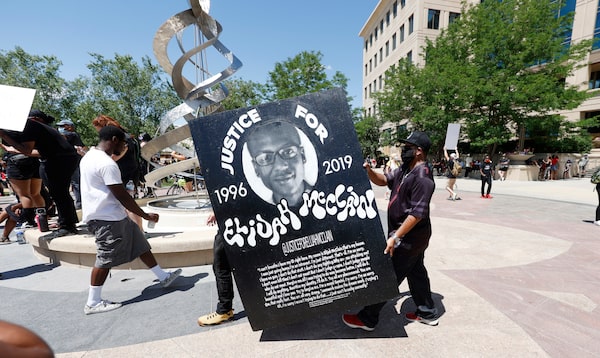
FILE - In this June 27, 2020, file photo, demonstrators carry a giant placard during a rally and march over the death of 23-year-old Elijah McClain outside the police department in Aurora, Colo. Multiple suburban Denver police officers have been placed on paid administrative leave amid an investigation into photos of them related to the case of a Black man who died last summer after he was stopped and restrained, police said Monday, June 29, 2020. The interim police chief of the city of Aurora, Vanessa Wilson, said in a statement that the suspended officers were "depicted in photographs near the site where Elijah McClain died." But her statement did not provide more details about what the images show. (AP Photo/David Zalubowski, File)David Zalubowski/The Associated Press
The police in Aurora, Colorado, opened an investigation into multiple officers after photos of them surfaced from near the site where Elijah McClain died after being restrained by police in a chokehold last year, the chief said late Monday.
Vanessa Wilson, the interim police chief in Aurora, said in a statement Monday night that an officer had reported allegations to internal affairs that “multiple Aurora Police officers were depicted in photographs near the site where Elijah McClain died.”
McClain, a 23-year-old massage therapist, died last summer after police in Aurora restrained him with a chokehold that has since been banned. His case has received renewed attention in the wake of the death of George Floyd, a Black man who died in Minneapolis police custody on May 25, in protests around the country. Over the weekend, demonstrators protested outside the Aurora Municipal Center, calling for accountability in McClain’s death.
Wilson said the officers involved were “immediately placed on administrative leave with pay in nonenforcement capacities.” She did not provide any detail about the allegations or what the photos contained, and did not identify any of the officers or say how many were put on leave.
A spokesman for the police department did not immediately respond to an inquiry Tuesday morning.
“This investigation will be publicly released in its entirety promptly upon its conclusion,” Wilson said. “This will include reports, photographic evidence obtained, officer’s names, and my final determination which can rise to the level of termination.”
Mayor Mike Coffman of Aurora, which lies about 10 miles outside Denver, also called for a special meeting of the City Council on Tuesday to hear from and ask questions of the police department about the mostly peaceful weekend protests over the death of McClain. Some protesters were struck by pepper spray, and Wilson said at a news conference that officers were struck by rocks and bottles.
“Those agitators dictated the use of force that we had to use because they were assaulting us,” she said. “I’m sure people that weren’t actually grabbing that baton got pepper spray on them, but again, they were told many many times to leave the area, and so they were in that position to be pepper sprayed.”
On Twitter, the police department said that officers did not use tear gas but did use pepper spray on “unruly” protesters.
“We are hearing many questions and concerns from the community about the tactics used by the Aurora Police Department during Saturday’s protests, and council needs to hear firsthand specifically what happened,” Coffman said in a statement Monday.
“The tragic death of Elijah McClain brought out many peaceful people over the weekend who want their voices heard, and unfortunately there were disruptions that overshadowed the broader message,” he added.
On Aug. 24, 2019, McClain was walking home from a convenience store when someone called 911, saying he “looked sketchy” and was wearing a ski mask and waving his arms.
The police arrived and, though McClain had not committed any crime, moved to handcuff him. After struggling to restrain McClain, the officers used a carotid hold, which restricts blood to the brain to render someone unconscious.
After paramedics arrived, they injected McClain with ketamine, a powerful sedative.
On the way to a hospital, McClain went into cardiac arrest. He died a few days later.
The Aurora authorities later identified the three officers who had arrived at the scene as Nathan Woodyard, Jason Rosenblatt and Randy Roedema; they were placed on administrative leave and later reinstated. After the autopsy report was released, Dave Young, the Adams County district attorney, announced that criminal charges would not be filed against them.
This month, Wilson announced a ban on carotid holds. On June 25, Gov. Jared Polis of Colorado ordered the attorney general to investigate the death of McClain, saying he “should be alive today, and we owe it to his family to take this step and elevate the pursuit of justice in his name to a statewide concern.”
On Tuesday, Mari Newman, a lawyer for his family, responded to the latest police statement by laying out allegations of misconduct against the department, including using “outrageous force” on McClain and pepper spray on peaceful protesters. “Just when we thought the Aurora Police could not be any worse, they somehow find a new low,” she said.
Our Morning Update and Evening Update newsletters are written by Globe editors, giving you a concise summary of the day’s most important headlines. Sign up today.